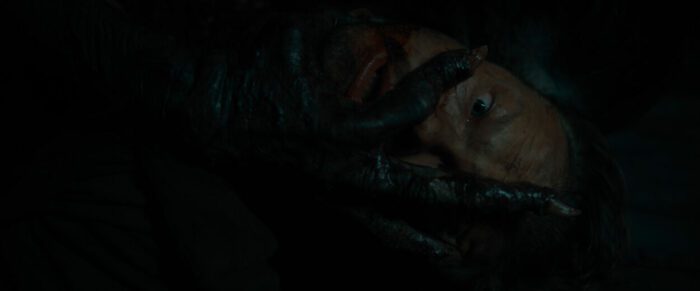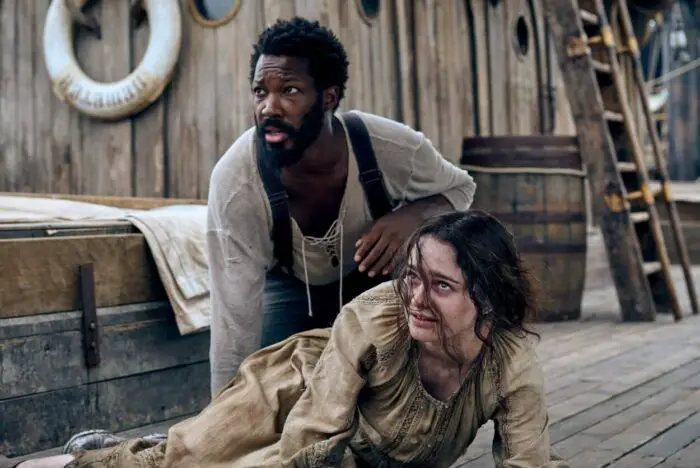EDITOR’S NOTE: This piece was written during the 2023 WGA and SAG-AFTRA strikes. Without the labor of the writers and actors currently on strike, films like The Last Voyage of the Demeter might not exist.
If Universal’s Renfield earlier this spring was any indication, it would seem that Dracula, the original monster in the studio’s hallowed horror stable, had aged out of the traditional monster movie and into the realm of postmodern irony. By contrast, The Last Voyage of the Demeter arrives mere months later with deadly seriousness, as if to reaffirm the character’s efficacy for the genre that established the studio’s “house style” all the way back in the 1930s.
It’s precisely this back-to-basics approach that is sure to alienate a sector of viewers who need their horror to be “elevated,” perhaps accounting for the bleak performance at the box-office on opening weekend ($6.5 million against a $45-million budget, despite enthusiastic endorsements from horror veterans Guillermo del Toro and Stephen King). Last Voyage has also garnered less-than-positive reviews, apparently measuring the film against middlebrow criteria of quality; this sort of critical reception is nothing new in the genre’s history. But to criticize the film for being slow, formulaic, decidedly unedgy, or lacking in character development—all true enough, if not terribly illuminating things one could say about it—is in some ways an unwillingness to meet the film on its own terms.
Beautifully helmed by Norwegian director André Øvredal (Scary Stories to Tell in the Dark [2019]), Last Voyage is Universal’s latest revival of one of its classic monsters, following Renfield and the more successful The Invisible Man (2020). A science-fiction/western reimagining of Dracula (1931) is currently in development from Chloé Zhao and a remake of The Bride of Frankenstein (1935) is scheduled to begin shooting early next year starring Christian Bale and Peter Sarsgaard, under the direction of Maggie Gyllenhaal. Not to be confused with Universal’s cancelled “Dark Universe,” this series comprises stand-alone films not existing in continuity with the most recent version of The Mummy (2017) starring Tom Cruise (that infamous critical and financial letdown, ringing the death-knell for the studio’s shared-world franchise á la the Marvel Cinematic Universe).
Last Voyage is not, however, an updating of Dracula, the 1931 film, but an adaptation of a section in Bram Stoker’s 1897 epistolary novel Dracula—found in Chapter 7, to be exact—presented as entries in the logbook that belongs to the captain of the merchant ship the Demeter. As the Demeter sails from Varna, Bulgaria, to Whitby, England, carrying 50 large, wooden crates, all mysteriously unmarked, crewmembers die one by one at the hands of an unknown assailant, who turns out to be the vampire Dracula. Øvredal’s Dracula (played by Javier Botet) hardly looks like the gentleman-count (played by Bela Lugosi) of the 1931 film. Instead, he more closely resembles the bestial Orlok (played by Max Schreck) from Nosferatu (1922), an unofficial adaptation of Stoker’s novel.

Aboard the Demeter are Captain Elliot (Liam Cunningham) and his first mate Wojchek (a typically spooky David Dastmalchian), Elliot’s grandson Toby (Woody Norman), a young physician named Clemens (Corey Hawkins), a stowaway named Anna (Aisling Franciosi), the ship’s cook Joseph (Jon Jon Briones), and an assortment of nondescript crewmembers (Stefan Kapičić, Nikolai Nikolaeff, Martin Furulund, and Chris Walley). Although the film is hampered by an inelegant, open-ended coda that presumably allows Universal to reserve the right to continue the story with a direct sequel, Øvredal treats the doomed voyage of the Demeter as a sad, irreversible course for death: the ultimate destination. The inevitability of that conclusion will come as no surprise to viewers familiar with the Dracula story (or who paid attention to the film’s title), but it’s what gives the film its relentless power as a work of screen horror. Øvredal puts the emphasis on atmosphere and mood over surprise, seeking to expand on Stoker’s narrative within the bounds of fidelity to its canonical literary source.

At the risk of overstating the film’s old-school approach, I should add that Øvredal doesn’t skimp on the gore; Last Voyage earns its R rating. In that respect, among others, Last Voyage has more in common with Francis Ford Coppola’s Bram Stoker’s Dracula (1992) than the film’s Universal progenitors from the 1930s and 1940s. The author of the script’s first draft, Bragi F. Schut, actually worked in a Hollywood model shop and became friends with a model maker who designed a miniature of the Demeter for Coppola’s adaptation. Inspired by the story of the Demeter, which reminded him of the Nostromo in Alien (1979), Schut wrote the script on spec and it was optioned as early 2003 before getting passed from director to director and studio to studio for nearly two decades, undergoing a series of rewrites. Zak Olkewicz was responsible for the final draft and shares co-writing credit with Schut.
The film betrays the wear and tear of the screenplay, and indeed the writing is not the film’s strongest feature. Yet, before dismissing it out of hand on these grounds, consider how—with a few notable exceptions—dialogue, story, and character development were rarely the essential makings of great monster movies from the classic era. They were about full moons on misty nights and the stygian shadows that suggest deep portals opening to other worlds. The Last Voyage of the Demeter is that kind of monster movie.



